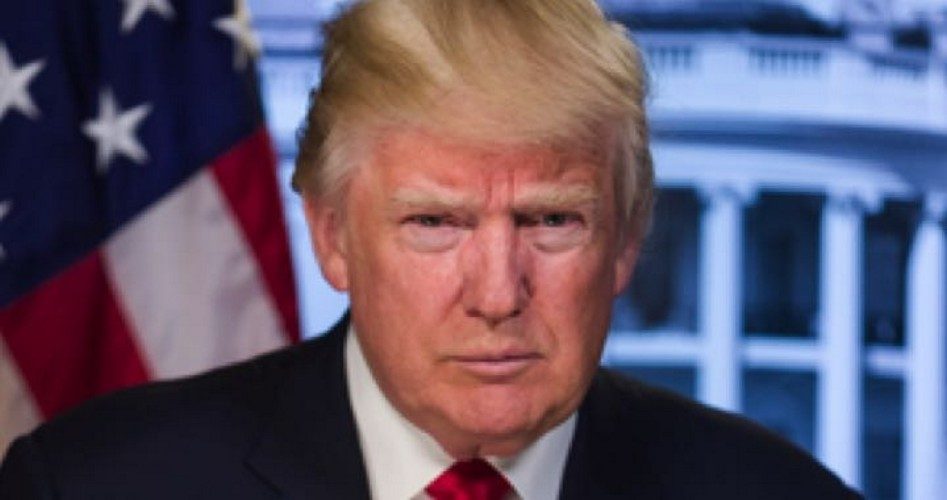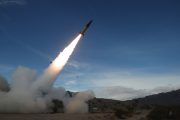
Facing a veto-proof super-majority in Congress, President Donald Trump reluctantly and privately signed H.R. 3364 on August 2, piling more sanctions on Russia, Iran, North Korea. But despite trying to put a smiley face on the developments, Trump made his displeasure known publicly in a series of statements. And in a message to Congress, the president even suggested — without actually saying it — that he may consider trying to get around lawmakers’ “unconstitutional” “preferences” as expressed in the sanctions measure. In short, tensions between Congress and the president, as well as tensions between the U.S. government and various foreign powers, just got ratcheted up yet another notch. Critics argued that the sanctions bill was a terrible idea that would harm everyone involved — potentially with dangerous implications. Neocons, globalists, warmongers, and other establishment forces, though, celebrated it as a victory.
The White House reportedly lobbied Congress to ease the restrictions contained within the bill, formally dubbed “Countering America’s Adversaries Through Sanctions Act.” But while Trump got some positive changes and agreed with some of the legislation, he clearly was not pleased with the final product overall. Calling the bill “seriously flawed,” Trump said in one of the statements he released that it “improperly encroaches on Executive power, disadvantages American companies, and hurts the interests of our European allies.” Trump also argued that the legislation limits his ability to negotiate with foreign powers. And several parts of it, he suggested, were unconstitutional. “In its haste to pass this legislation, the Congress included a number of clearly unconstitutional provisions,” Trump argued, offering a series of examples.
The Constitution delegates a great deal of authority over foreign affairs to the Congress, including on international trade, declarations of war, and other important powers. However, Trump pointed to a number of areas where he said the new legislation infringes on powers delegated to the executive branch. Among others, he cited sections 253 and 257, which “purport to displace the President’s exclusive constitutional authority to recognize foreign governments, including their territorial bounds, in conflict with the Supreme Court’s recent decision in Zivotofsky v. Kerry.” The president also blasted sections 254 and 257 that “purport to direct my subordinates in the executive branch to undertake certain diplomatic initiatives, in contravention of the President’s exclusive constitutional authority to determine the time, scope, and objectives of international negotiations.”
Other provisions of the bill, Trump continued, citing more than a half-dozen sections, seek to require Trump to deny entry into the United States to certain people, “without an exception for the President’s responsibility to receive ambassadors under Article II, section 3 of the Constitution.” Pointing to section 216, Trump said the bill seeks to grant powers to Congress that would allow it to change the law without going through the constitutionally required process. It also prescribes a review period that prevents Trump from taking certain actions. Citing the Supreme Court’s decision in INS v. Chadha, Trump said certain provisions were in conflict with the ruling “because they purport to allow the Congress to extend the review period through procedures that do not satisfy the requirements for changing the law under Article I, section 7 of the Constitution.”
Because of the constitutional issues, Trump indicated that he may not be bound by the entire statute. “My Administration will give careful and respectful consideration to the preferences expressed by the Congress in these various provisions and will implement them in a manner consistent with the President’s constitutional authority to conduct foreign relations,” Trump said. He did say that, despite his concerns, he expected to honor the extended waiting periods prescribed in the bill so that Congress would have a “full opportunity to avail itself of the bill’s review procedures.” But the president also warned Congress to “refrain from using this flawed bill to hinder our important work with European allies to resolve the conflict in Ukraine, and from using it to hinder our efforts to address any unintended consequences it may have for American businesses, our friends, or our allies.”
In a separate statement released after signing the bill, Trump said he too wanted to “punish and deter bad behavior by the rogue regimes in Tehran and Pyongyang.” He also said America would not tolerate “interference in our democratic process,” a reference to the Kremlin’s alleged meddling. The administration will side with U.S. allies and friends against “Russian subversion and destabilization,” he added in a presumed reference to what happened in Ukraine. That is why Trump said he, too, has imposed sanctions on North Korea and Iran while tightening existing ones on Russia. However, looking beyond the constitutional issues addressed in his first statement, Trump highlighted a number other concerns he had with the legislation. Indeed, hearkening back to the stunning betrayal by some congressional Republicans such as Senator John McCain (R-Ariz.) who voted to save ObamaCare, Trump brazenly ridiculed Congress.
“Congress could not even negotiate a healthcare bill after seven years of talking,” Trump said in the second statement. “By limiting the Executive’s flexibility, this bill makes it harder for the United States to strike good deals for the American people, and will drive China, Russia, and North Korea much closer together. The Framers of our Constitution put foreign affairs in the hands of the President. This bill will prove the wisdom of that choice. Yet despite its problems, I am signing this bill for the sake of national unity. It represents the will of the American people to see Russia take steps to improve relations with the United States. We hope there will be cooperation between our two countries on major global issues so that these sanctions will no longer be necessary.” Touting his own business prowess, Trump added a final dig at lawmakers: “I can make far better deals with foreign countries than Congress.”
Former Congressman Ron Paul (R-Texas), who ran for president and became a hero to many liberty-minded Americans for his steadfast adherence to principle, said the fresh sanctions were “a prime example of how little thought goes into U.S. foreign policy.” “No matter what the problem, no matter where on earth it occurs, the answer from Washington is always sanctions,” said Paul, a medical doctor who founded the noninterventionist Ron Paul Institute for Peace and Prosperity, “Sanctions are supposed to force governments to change policies and do what Washington tells them or face the wrath of their people. So the goal of sanctions is to make life as miserable as possible for civilians so they will try to overthrow their governments. Foreign leaders and the elites do not suffer under sanctions. This policy would be immoral even if it did work, but it does not.”
Blasting “neocons and the media” for designating Russia as the “official enemy,” Paul lambasted the “military industrial complex and other special interests” seeking to get rich by “terrifying Americans into believing the propaganda.” Then he addressed each of the regimes targeted by sanctions. On Iran, Paul noted that the White House had affirmed that the government there was upholding its obligations under the nuclear treaty, and ridiculed the idea that Iran and Russia were “destabilizing” Syria by helping fight ISIS and al-Qaeda. He also said Iran had not committed a terrorist act on U.S. soil, while the declassified documents from the Congressional 9/11 Report suggested the Saudi regime was “deeply involved.” On North Korea, the former congressman said the sanctions would further harm suffering civilians and that North Korea posed no serious threat to the United States.
“We can’t run the world. We are out of money,” concluded Paul, calling on Trump to veto the “foolish” sanctions bill and “begin dismantling neocon control of his administration.”
Russian authorities, meanwhile, responded to the measure by retaliating and ordering hundreds of U.S. diplomats out of the country. Prime Minister Dmitry Medvedev said Wednesday that the new sanctions were tantamount to declaring a “full-scale trade war.” According to media reports, Medvedev said the sanctions showed Trump was “utterly powerless” and that any hope for improved relations with the new U.S. administration is “finished.” U.S. Secretary of State Rex Tillerson also expressed dismay at the congressionally mandated sanctions.
More than a few analysts said President Trump should have vetoed the legislation — especially if he truly believed it was unconstitutional. Even if Congress decided to override the veto, a likely prospect, at least he would not be made complicit in abuses of the Constitution. Furthermore, even if the bill were constitutional in every respect, that does not make it a good idea. With $20 trillion in debt and as much as $200 trillion in unfunded liabilities, Congress ought to focus on slashing unconstitutional spending and reining in out-of-control government at home, rather than trying to police the world and micromanage the behavior of foreign governments. Generations of U.S. interventionism have produced misery and disaster all over the world, while impoverishing Americans. U.S. lawmakers and Trump would be wise to pursue an “America First” policy and follow the advice of America’s Founders by avoiding foreign entanglements.
Photo of Donald Trump: Whitehouse.gov
Alex Newman is a correspondent for The New American, covering economics, education, politics, and more. He can be reached at [email protected]. Follow him on Twitter @ALEXNEWMAN_JOU or on Facebook.
Related articles:
Trump Should Veto Congress’ Foolish New Sanctions Bill
U.S.-imposed Sanctions to Squeeze Venezuela’s Marxist Dictator
Are Worsening U.S.-Russian Relations a Victim of American Politics?
North Korea or Iran … Where Will President Trump Attack First?
Lawmakers Blast UN for Handing U.S. Technology to North Korea, Iran
Trump-Russia Connection or Wild Conspiracy Theory?
Putin: Key Player in the “New World Order”



